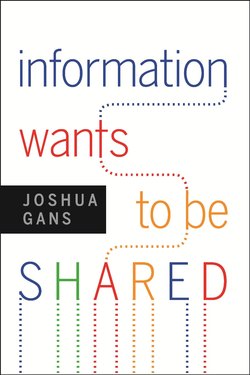Читать книгу Information Wants to Be Shared - Joshua Gans - Страница 9
На сайте Литреса книга снята с продажи.
Predicting the Price of Information
ОглавлениеThe origin of the saying “information wants to be free” was a remark by Stewart Brand to Steve Wozniak at the Hackers Conference in 1984. Brand said,
On the one hand information wants to be expensive, because it’s so valuable. The right information in the right place just changes your life. On the other hand, information wants to be free, because the cost of getting it out is getting lower and lower all the time. So you have these two fighting against each other. [1]
Somehow, we’ve forgotten all but part of the third sentence of Brand’s comment. In its entirety, it is a statement regarding what price information might sell for and it is agnostic regarding whether that price might be high or low. In that respect, information is in good company.
The standard way to predict price movements is to examine changes in supply and demand. In the case of information, the easiest place to start is supply and, specifically, why information might want to be free: the cost of distributing information is falling and is now arguably costless. (Because someone has to allocate attention to processing some particular bit of information, there are always costs in getting information through the last neuron. But up until that point, nowadays, getting an extra bit of information from where it is to a person does not take up real resources.)
The reason there is a price is to economize on scarce resources, but if distribution costs are zero (or nearly so), then a price of zero will not stand in distribution’s way. This is why “information wants to be free” is that part of Brand’s quote that is so often evangelized. [2] It is perfectly consistent with this piece of the economics of information and the logic that “since it isn’t costing anything for you to release information to me, I might expect to be able to get it without having to pay.”
While information wanting to be free has to do with its supply, information wanting to be expensive is a statement about demand. In particular, Brand notes that information can be useful and valuable to individuals. And the economic logic goes something like, “If information is valuable to you, by paying me, I’ll have an incentive to release it to you.”
Seen in this light, information is no different than many other goods traded on the market. Coffee, for instance, can be produced at relatively low marginal cost even though many people desperately need it every morning (and most afternoons). The eventual price of coffee will reflect both of these things, the low marginal cost of production and distribution and the great demand. We would not, however, describe the eventual price as a fight. If coffee cost a lot to produce, one would not normally consider peace breaking out in the coffee market. Thus, the tension that Brand identifies is not fundamental to information. Instead, it is just a statement that there happens to be a supply side and a demand side to information, and like all other goods and services, that their resolution determines price.
Yet the ambiguity in Brand’s mind regarding what will happen to the price of information is real. Information has become cheap to distribute and, possibly, more valuable over time. Both supply and demand have increased. Economics 101 tells us that, under these circumstances, one cannot say whether its price should rise or fall, if information should be free or expensive. What one can say is that more information wants to be distributed and consumed. Each force reinforces the other to provide more information than before. It isn’t a fight but a mutual effort toward more. And when it comes down to it, it is how much information exists rather than what precisely it sells for that is economically relevant.
